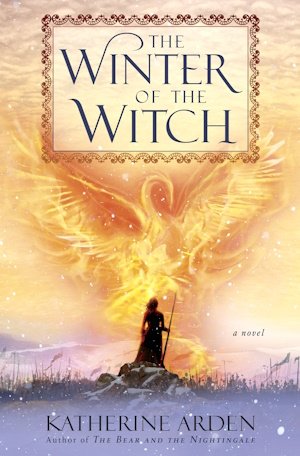He sat up, drew away from her, the line of his spine stiff in the near-dark.
“I wanted it,” she said to his back, trying not to think of every notion of decency she had ever been taught. Chastity, patience, lie with men only for the bearing of children, and above all do not enjoy it. “I thought—I thought you did too. And you—” She couldn’t say it; instead she said, “You remembered. A small enough price, for that.”
It didn’t feel small.
He turned so she could see his face; he didn’t look as though he believed her. Vasya wished now she were not sitting naked, a handsbreadth away from him.
He said, “I thank you.”
Thank you? The words struck coldly, after the last hours’ heat.
Maybe you wish you did not remember, she thought . Part of you was happy here, feared and beloved, in this prison. She didn’t say it.
“The Bear is free in Rus’,” said Vasya instead. “He has set the dead to walking. We must help my cousin, help my brother. I came to get your help.”
Still Morozko said nothing. He had not drawn further away from her, but his glance had turned inward, remote, unreadable.
She added with sudden anger, “You owe us your help; you are the reason that the Bear is free in the first place. You didn’t need to
bargain with him. I walked out of the pyre myself.”
A little light came into his face. “I wondered if you would. But it was still worth it. When you drew me back to Moscow, I knew then.”
“Knew what?”
“That you could be a bridge between men and chyerti. Keep us from fading, keep men from forgetting. That we weren’t doomed after all, if you lived, if you came into your power. And I had no other way to save you. I—deemed it worth the risk, whatever came after.”
“You might have trusted me to save myself.”
“You meant to die. I saw it in you.”
She flinched. “Yes,” she said softly. “I suppose I did mean to die.
Solovey had fallen; he died under my hands, and—” She broke off.
“But my horse would have called me foolish to give up. So, I changed my mind.”
The wild simplicity of the night was fading into endless complications. She had never imagined that he’d set his realm and his freedom at hazard purely for love of her. Part of her had wondered anyway, but of course he was king of a hidden kingdom, and he could not make his decision so. It was the power in her blood he’d wanted.
She was tired and cold and she ached.
She felt more alone than before.
Then she was angry at her own self-pity. For cold there was a remedy, and damn this new awkwardness between them. She slid again beneath the heavy, heaped-up blankets, turned her back to him. He did not move. She balled her body up on itself, trying to get warm alone.
A hand, light as a snowflake, brushed her shoulder. Tears had gathered in her eyes; she tried to blink them away. It was too much: his presence, cold and quiet, the reasonable and practical explanations, to contrast with the overwhelming memory of passion.
“No,” he said. “Do not grieve tonight, Vasya.”
“You would never have done it,” she said, not looking at him. “This
—” A vague gesture took in the bathhouse, them. “If you had been able to remember who I was. You would never have saved my life if I hadn’t been—if I hadn’t been—”
His hand left her shoulder. “I tried to let you go,” he said. “Again and again I tried. Because every time I touched you—even looked at you—it drew me nearer to mortality. I was afraid. And yet, I could not.” He broke off, continued. “Perhaps if you hadn’t been what you are, I would have found it in myself to let you die. But—I heard you scream. Through all the mists of my weakness, after the fire in Moscow, I heard you. I told myself I was being practical, I told myself you were our last hope. I told myself that. But I thought of you in the fire.”
Vasya turned to face him. He shut his lips tight, as though he’d said more than he wished.
“And now?” she asked.
“We are here,” he said simply.
“I am sorry,” she said. “I didn’t know how else to bring you back.”
“There was no other way. Why do you think my brother had such faith in his prison? He knew of no tie strong enough to draw me back to myself. Nor did I.”
Morozko didn’t sound happy about it. It occurred to Vasya that he might feel just as she did: raw. She put out a hand. He did not look at her, but his fingers closed about hers.
“I am still afraid,” he said. It was a truth, baldly offered. “I am glad you are alive. I am glad to see you again, against all hope. But I do not know what to do.”
“I am afraid too,” she said.
His fingertips found her wrist, where the blood surged against her skin. “Are you cold?”
She was. But…
“I think,” he said wryly, “all things considered, we should be able to share the same blankets a few hours more.”
“We must go,” said Vasya. “There is too much to do; there is not time.”

























